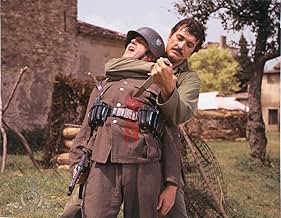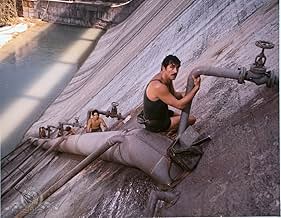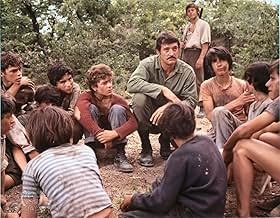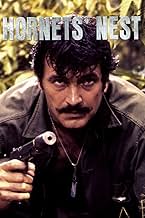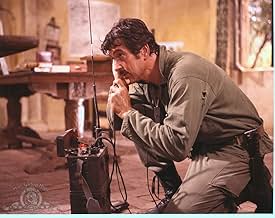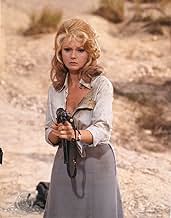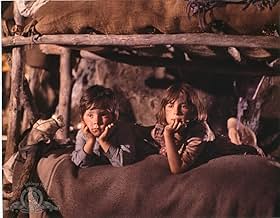CALIFICACIÓN DE IMDb
5.8/10
1.2 k
TU CALIFICACIÓN
Agrega una trama en tu idiomaIn 1944, during a sabotage mission, the sole surviving U.S. paratrooper is saved by a group of Italian orphans who later aid him in blowing up a vital enemy dam.In 1944, during a sabotage mission, the sole surviving U.S. paratrooper is saved by a group of Italian orphans who later aid him in blowing up a vital enemy dam.In 1944, during a sabotage mission, the sole surviving U.S. paratrooper is saved by a group of Italian orphans who later aid him in blowing up a vital enemy dam.
- Dirección
- Guionistas
- Elenco
Giacomo Rossi Stuart
- Schwalberg
- (as Giacomo Rossi-Stuart)
Opiniones destacadas
REVIEW OF THE VERSION SHOWN ON TURNER CLASSIC MOVIES IN NORTH America
This is one of many Italian WWII adventure films to be released in the late 1960s / early 1970s. It's a familiar story, presented in a unique way with some American aspects thrown in.
Leading man Rock Hudson stars as an American commando. His team is parachuted into Italy to blow a colossal, strategic dam. Hudson's unit is ambushed and he is the only survivor. He is "rescued" by a band of Italian youngsters, who con him into helping them wreak havoc on the Nazis who took over their town and killed their families. Meanwhile, Capt. von Hecht (Sergio Fantoni) leads a hunt for Hudson and must cope with the S.S. to do so.
This movie has a lot of fine aspects. First of all, it's got a very good international cast. American star Rock Hudson has had his share of fame in plenty of classic movies; he's had experience in the war movie genre, too, in TOBRUK and the marvelous ICE STATION ZEBRA. You'll see more of the incredibly beautiful Sylva Koscina than you've ever seen before; she's a nurse who's captured to aid Hudson, but is non-essential to the story. Just there to look at ... and there's plenty to see. Sergio Fantoni (VON RYAN'S EXPRESS) is very good as the one-eyed German Captain von Hecht, who will stop at nothing to stop Hudson from destroying the dam. Giacomo Rossi-Stuart (BATTLE FORCE, THE LAST 4 DAYS) has a very minor part as Fantoni's aide. Mark Colleano is incredibly good as the selfish leader of the youngster gang. His performance is brilliant and he deserves more credit than he gets. Plenty of familiar "German" character-actors ... Tom Felleghy (THE BATTLE OF EL ALAMEIN) appears as a German colonel. Max Tarilli (THE DEVIL'S BRIGADE) as a German Colonel. Gerard Herter (LAST DAY OF THE WAR) as the commander of the dam. Watch for Andrea Bosic from DIABOLIK as a German General.
The action scenes are sparse and involve few extras. The last big scene on the dam is well-done for the most part, but there are still a few corny moments. Several times, the camera focuses on a sole machine-gunner and you can hear men screaming, but you never get to see the victims. The cinematography is marvelous and breathtaking, as this was filmed on location in Italy. The musical score by Ennio Morricone is pretty good, but surprisingly not anywhere near as good as his Leone scores. The script is intelligent is tells a familiar story from a unique viewpoint; showing young pre-teens battling the Nazis with machine guns and grenades is something that's rarely done. No striking dialog or directorial tricks from Karlson, who did the great HELL TO ETERNITY ten years earlier, but it's still a good adventure / suspense flick. The only negative thing I can think of is the HORRIBLY OUT OF PLACE antiwar statement near the end. It stresses that people get so caught up in war that they make horrible mistakes and come to mourn over them later on. Come on, guys -- the first 105 minutes showed war as a big adventure, and the last 5 makes it look like a colossal tragedy. Sure, I think war IS bad and should be avoided if possible; but if you're gonna make an action movie, don't try to make a big statement at the end. It ruins what's been accomplished during the rest of the movie.
I saw this on video from MGM. It's an incredibly rare VHS tape, released for a short time in 1993. I found a brand new one on half.com for a great price and snatched it immediately. The print is pan & scan, except for the credits, which are widescreen, I'd say about 1.78:1. The colors are accurate and striking. There are hardly an flaws like scratches, etc. This is worth seeking out and buying for a decent price.
Overall, for the cast, Morricone music and unique approach to the subject matter, I'll give it a 6/10. With a better ending, it could have been a 7/10.
This is one of many Italian WWII adventure films to be released in the late 1960s / early 1970s. It's a familiar story, presented in a unique way with some American aspects thrown in.
Leading man Rock Hudson stars as an American commando. His team is parachuted into Italy to blow a colossal, strategic dam. Hudson's unit is ambushed and he is the only survivor. He is "rescued" by a band of Italian youngsters, who con him into helping them wreak havoc on the Nazis who took over their town and killed their families. Meanwhile, Capt. von Hecht (Sergio Fantoni) leads a hunt for Hudson and must cope with the S.S. to do so.
This movie has a lot of fine aspects. First of all, it's got a very good international cast. American star Rock Hudson has had his share of fame in plenty of classic movies; he's had experience in the war movie genre, too, in TOBRUK and the marvelous ICE STATION ZEBRA. You'll see more of the incredibly beautiful Sylva Koscina than you've ever seen before; she's a nurse who's captured to aid Hudson, but is non-essential to the story. Just there to look at ... and there's plenty to see. Sergio Fantoni (VON RYAN'S EXPRESS) is very good as the one-eyed German Captain von Hecht, who will stop at nothing to stop Hudson from destroying the dam. Giacomo Rossi-Stuart (BATTLE FORCE, THE LAST 4 DAYS) has a very minor part as Fantoni's aide. Mark Colleano is incredibly good as the selfish leader of the youngster gang. His performance is brilliant and he deserves more credit than he gets. Plenty of familiar "German" character-actors ... Tom Felleghy (THE BATTLE OF EL ALAMEIN) appears as a German colonel. Max Tarilli (THE DEVIL'S BRIGADE) as a German Colonel. Gerard Herter (LAST DAY OF THE WAR) as the commander of the dam. Watch for Andrea Bosic from DIABOLIK as a German General.
The action scenes are sparse and involve few extras. The last big scene on the dam is well-done for the most part, but there are still a few corny moments. Several times, the camera focuses on a sole machine-gunner and you can hear men screaming, but you never get to see the victims. The cinematography is marvelous and breathtaking, as this was filmed on location in Italy. The musical score by Ennio Morricone is pretty good, but surprisingly not anywhere near as good as his Leone scores. The script is intelligent is tells a familiar story from a unique viewpoint; showing young pre-teens battling the Nazis with machine guns and grenades is something that's rarely done. No striking dialog or directorial tricks from Karlson, who did the great HELL TO ETERNITY ten years earlier, but it's still a good adventure / suspense flick. The only negative thing I can think of is the HORRIBLY OUT OF PLACE antiwar statement near the end. It stresses that people get so caught up in war that they make horrible mistakes and come to mourn over them later on. Come on, guys -- the first 105 minutes showed war as a big adventure, and the last 5 makes it look like a colossal tragedy. Sure, I think war IS bad and should be avoided if possible; but if you're gonna make an action movie, don't try to make a big statement at the end. It ruins what's been accomplished during the rest of the movie.
I saw this on video from MGM. It's an incredibly rare VHS tape, released for a short time in 1993. I found a brand new one on half.com for a great price and snatched it immediately. The print is pan & scan, except for the credits, which are widescreen, I'd say about 1.78:1. The colors are accurate and striking. There are hardly an flaws like scratches, etc. This is worth seeking out and buying for a decent price.
Overall, for the cast, Morricone music and unique approach to the subject matter, I'll give it a 6/10. With a better ending, it could have been a 7/10.
It has been argued the Germans during World War Two made a number of mistakes with the various countries they conquered. In some cases, those mistakes were colossal. Take this film for instance. It's called " Hornets Nest " and takes place in 1944, near Reanoto, Italy. The small village is suspected of aiding the Partisans. These guerrilla, groups have become so annoying to the Germans, the local military Italian governor is replaced by a brutal SS Officer. Upon reaching the town, he rounds up the villagers and order them to reveal the Partisans upon pain of death. Bad mistake, but one which the Germans inflict with Nazi efficiency. Their children, learn the US military is sending a team of Commandos to destroy the dam near the town. The SS discover the drop zone and massacre all the airborne troops except one. The single survivor called Turner (Rock Hudson) awakens from his wounds and discovers he owes his life to a group of Teenage boys. Informed the SS is searching for him, Turner also learns an experience German Officer name Von Hecht (Sergio Fantoni) is also closing in on his whereabouts. Realizing, he has little choice, Turner decides to use his hate-filled and revenge seeking youths to continue his mission to destroy the dam. Accompanying him is a kidnapped female doctor (Sylva Koscina) who reluctantly joins the group. The movie itself is interesting in that instead of battle hard soldiers, Hudson has to first teach the kids to kill and then later must reverse his lessons. To the credit of the young cast, the teens lead by vengeance seeking Aldo (Mark Colleano) do a remarkable job of acting. From deep sorrow to hate spewing machine-gun scenes, they add to the over the top drama. In all, this action film does an honest job of creating a military Classic. However, much as I enjoy Hudson the actor, I can't help feel Charles Bronson or Burt Lancaster would have been a better choice as Husdon is not convincing as a rapist of women or abuser of children. ****
The movie emerges from a period in which World War II cinema was undergoing a crucial transition. The late 1960s and early 1970s saw a growing fatigue with the glorification of war; the trauma of Vietnam had begun to influence how audiences and filmmakers alike viewed armed conflict, pushing war films into more ambiguous, morally grey territories. This film is a product of that in-between moment - still shaped by the action-adventure expectations of mid-century war cinema, yet increasingly marked by a grim, introspective undercurrent, particularly evident in its unorthodox choice of protagonists and unsettling psychological tone.
Cinematically, the film is shot with a utilitarian clarity. The cinematography opts for a functional realism that, while rarely inspired, serves the narrative's harsh thematic direction. There is a certain arid starkness to the Italian landscapes standing in for northern Italy during the German occupation, which contrasts interestingly with the narrative's descent into psychological murk. The film avoids the lush, panoramic compositions typical of war spectacles like The Guns of Navarone (1961) or Where Eagles Dare (1968). Instead, it deploys a more intimate framing that brings the viewer uncomfortably close to the tension between its characters, particularly in the scenes involving the band of orphaned boys who shift rapidly from victimhood to violent agency.
The sound design and musical score feel almost intrusive at times - not in their volume or instrumentation, but in the way they often seem to be doing narrative work that the image struggles to shoulder. There's a persistent sense that the film's score is trying to orient the viewer emotionally toward a kind of mythologized heroism, but it remains in uneasy conflict with the disturbing implications of the boys' transformation under the guidance of an American saboteur. This contrast between audio and visual tone is dissonant, though perhaps not unintentionally so, highlighting the thematic instability at the film's core. It's also worth noting that the choice of Ennio Morricone as composer, while striking on paper, might not have been entirely suitable for the demands of this film. His musical voice, so effective in stylized, psychologically expressive or operatic narratives, often overwhelms subtler textures and is less at ease in depicting the grim, ambiguous realism that this particular story might have benefited from. The score seems at times too melodically insistent, almost too poetic for the brutal, morally jagged landscape the film inhabits.
Performance-wise, the film hinges on a difficult axis: an adult lead who must project both authority and inner fracture, and a group of child actors tasked with portraying a complex moral unraveling. The former delivers a portrayal that, while occasionally veering toward the melodramatic, maintains a credible tension between military professionalism and ethical disintegration. The children, however, vary in effectiveness. The unevenness of their performances underscores the film's uneasy balance between pulp adventure and moral fable - a duality it never entirely resolves. This lack of resolution could be read as a weakness, but within the war film subgenre focusing on sabotage and resistance in occupied territories, this ambiguity can also be understood as deliberate, reflecting the ideological tensions of the era in which the film was made.
Comparatively, The Train (1964) offers a sharper, more technically precise take on sabotage operations in Nazi-occupied Europe, grounding its narrative in a more industrial, material world - rail yards, cargo, and logistical resistance - whereas this film leans toward a more psychological and symbolic framework. The Train also maintains a tighter control of tone and pacing, never allowing the action to obscure the deeper questions of value and sacrifice. In contrast, Hornets' Nest pushes its moral inquiry through a kind of allegorical brutality, sacrificing tonal coherence for thematic provocation.
There's also an evident thematic kinship with Play Dirty (1969), another WWII sabotage narrative that resists romanticism, favoring moral corrosion and ambiguous motives. Both films share an interest in how war reshapes identities and erodes any stable definition of heroism, though this film ventures further into uncomfortable territory by placing children at the moral center. Unlike Play Dirty, which presents adult cynicism and duplicity as inevitable in wartime, this film's horror lies in the corruption of innocence - a stark, unsettling deviation from the more typical soldier's journey narrative.
Technically, the editing reveals some of the production's limitations. Transitions can be abrupt, and the spatial geography of action scenes is not always clearly established. This occasionally compromises narrative tension, particularly during the more chaotic sequences. Nevertheless, these rough edges contribute to a sense of instability that mirrors the psychological disintegration at play.
Adding to this fragility is the question of historical verisimilitude. Certain period details - such as the boys' haircuts, the condition and cut of their clothing, and even their body language - undermine credibility, reminding the viewer that this is still a film of its era, made within the aesthetic and technical constraints of 1970. These anachronisms may seem minor, but in a film that already demands a large suspension of disbelief, particularly in its depiction of children effortlessly carrying out guerrilla-style attacks and the almost mythical invincibility of their American mentor, such cracks in the surface become more conspicuous. The ease with which the protagonists dismantle German positions - including a barracks and a dam checkpoint - strains credibility even within the conventions of war cinema. The American saboteur borders on the archetype of a pre-Rambo figure, a super-soldier whose capabilities dwarf any plausible military realism. This heroic exaggeration undermines the otherwise sobering psychological and moral themes the film attempts to explore.
All of this contributes to a sense that the film has something substantial at its core - an idea with real weight and moral discomfort - but lacks the cohesion and finesse to fully bring it to maturity. It is as if it falls just short of being the film it aspires to be. Still, there is something undeniably compelling about its ambition. Within the subgenre of WWII sabotage and resistance films, it stands out for its unique thematic choice: children not just as witnesses to war but as its instruments, shaped and twisted by the brutality surrounding them.
From a purely cinematographic perspective, one might lean toward giving the film 6 stars out of 10 - acknowledging its originality and daring, while also recognizing its technical and narrative shortcomings. However, when accounting for its thematic boldness, the singularity of its premise within the genre, and the lingering impact of its moral ambiguities, it can reasonably earn a 7. It may be flawed in execution, but it offers something rare: a war film that doesn't flatter the myths of heroism, and instead drags the viewer into a deeply uncomfortable confrontation with the idea of what war - even a "just" war - can do to those forced to grow up inside it. In fact, the strength of its central idea is such that one can't help but feel this is a film that deserves a serious remake - one that could preserve the disturbing moral core while refining the technical weaknesses and grounding the action in a more believable context. With the right tone and craftsmanship, the story could finally reach the full cinematic depth that the original screenplay was straining toward but never quite attained.
Cinematically, the film is shot with a utilitarian clarity. The cinematography opts for a functional realism that, while rarely inspired, serves the narrative's harsh thematic direction. There is a certain arid starkness to the Italian landscapes standing in for northern Italy during the German occupation, which contrasts interestingly with the narrative's descent into psychological murk. The film avoids the lush, panoramic compositions typical of war spectacles like The Guns of Navarone (1961) or Where Eagles Dare (1968). Instead, it deploys a more intimate framing that brings the viewer uncomfortably close to the tension between its characters, particularly in the scenes involving the band of orphaned boys who shift rapidly from victimhood to violent agency.
The sound design and musical score feel almost intrusive at times - not in their volume or instrumentation, but in the way they often seem to be doing narrative work that the image struggles to shoulder. There's a persistent sense that the film's score is trying to orient the viewer emotionally toward a kind of mythologized heroism, but it remains in uneasy conflict with the disturbing implications of the boys' transformation under the guidance of an American saboteur. This contrast between audio and visual tone is dissonant, though perhaps not unintentionally so, highlighting the thematic instability at the film's core. It's also worth noting that the choice of Ennio Morricone as composer, while striking on paper, might not have been entirely suitable for the demands of this film. His musical voice, so effective in stylized, psychologically expressive or operatic narratives, often overwhelms subtler textures and is less at ease in depicting the grim, ambiguous realism that this particular story might have benefited from. The score seems at times too melodically insistent, almost too poetic for the brutal, morally jagged landscape the film inhabits.
Performance-wise, the film hinges on a difficult axis: an adult lead who must project both authority and inner fracture, and a group of child actors tasked with portraying a complex moral unraveling. The former delivers a portrayal that, while occasionally veering toward the melodramatic, maintains a credible tension between military professionalism and ethical disintegration. The children, however, vary in effectiveness. The unevenness of their performances underscores the film's uneasy balance between pulp adventure and moral fable - a duality it never entirely resolves. This lack of resolution could be read as a weakness, but within the war film subgenre focusing on sabotage and resistance in occupied territories, this ambiguity can also be understood as deliberate, reflecting the ideological tensions of the era in which the film was made.
Comparatively, The Train (1964) offers a sharper, more technically precise take on sabotage operations in Nazi-occupied Europe, grounding its narrative in a more industrial, material world - rail yards, cargo, and logistical resistance - whereas this film leans toward a more psychological and symbolic framework. The Train also maintains a tighter control of tone and pacing, never allowing the action to obscure the deeper questions of value and sacrifice. In contrast, Hornets' Nest pushes its moral inquiry through a kind of allegorical brutality, sacrificing tonal coherence for thematic provocation.
There's also an evident thematic kinship with Play Dirty (1969), another WWII sabotage narrative that resists romanticism, favoring moral corrosion and ambiguous motives. Both films share an interest in how war reshapes identities and erodes any stable definition of heroism, though this film ventures further into uncomfortable territory by placing children at the moral center. Unlike Play Dirty, which presents adult cynicism and duplicity as inevitable in wartime, this film's horror lies in the corruption of innocence - a stark, unsettling deviation from the more typical soldier's journey narrative.
Technically, the editing reveals some of the production's limitations. Transitions can be abrupt, and the spatial geography of action scenes is not always clearly established. This occasionally compromises narrative tension, particularly during the more chaotic sequences. Nevertheless, these rough edges contribute to a sense of instability that mirrors the psychological disintegration at play.
Adding to this fragility is the question of historical verisimilitude. Certain period details - such as the boys' haircuts, the condition and cut of their clothing, and even their body language - undermine credibility, reminding the viewer that this is still a film of its era, made within the aesthetic and technical constraints of 1970. These anachronisms may seem minor, but in a film that already demands a large suspension of disbelief, particularly in its depiction of children effortlessly carrying out guerrilla-style attacks and the almost mythical invincibility of their American mentor, such cracks in the surface become more conspicuous. The ease with which the protagonists dismantle German positions - including a barracks and a dam checkpoint - strains credibility even within the conventions of war cinema. The American saboteur borders on the archetype of a pre-Rambo figure, a super-soldier whose capabilities dwarf any plausible military realism. This heroic exaggeration undermines the otherwise sobering psychological and moral themes the film attempts to explore.
All of this contributes to a sense that the film has something substantial at its core - an idea with real weight and moral discomfort - but lacks the cohesion and finesse to fully bring it to maturity. It is as if it falls just short of being the film it aspires to be. Still, there is something undeniably compelling about its ambition. Within the subgenre of WWII sabotage and resistance films, it stands out for its unique thematic choice: children not just as witnesses to war but as its instruments, shaped and twisted by the brutality surrounding them.
From a purely cinematographic perspective, one might lean toward giving the film 6 stars out of 10 - acknowledging its originality and daring, while also recognizing its technical and narrative shortcomings. However, when accounting for its thematic boldness, the singularity of its premise within the genre, and the lingering impact of its moral ambiguities, it can reasonably earn a 7. It may be flawed in execution, but it offers something rare: a war film that doesn't flatter the myths of heroism, and instead drags the viewer into a deeply uncomfortable confrontation with the idea of what war - even a "just" war - can do to those forced to grow up inside it. In fact, the strength of its central idea is such that one can't help but feel this is a film that deserves a serious remake - one that could preserve the disturbing moral core while refining the technical weaknesses and grounding the action in a more believable context. With the right tone and craftsmanship, the story could finally reach the full cinematic depth that the original screenplay was straining toward but never quite attained.
So-so wartime movie follows a group of children saboteurs commanded by an Allied officer whose aim is to blow up a dam vital to the Nazis in Italy. It happens during WWWII when Captain Turner (a moustachioed Rock Hudson )is lone survivor of an Army commando unit that parachuted into the Italian countryside . A small group of orphans must rescue the American captain to be hold by the Nazis. Then the wounded captain is saved , meanwhile the children kidnap a German doctor ( a sultry Sylvia Koscina but rather unlikely medic) . Turner wants the kids to help him blow up a dam and the boys want his help in getting avenge on the Nazis (Sergio Fantoni ,Jacques Sernas,Gerad Herter, Andrea Bosic) who had massacred his families and occupied their small village.
This warlike movie packs well-staged action scenes , double-crosses, thrills, blood-letting images and criticism about the futility of war but doesn't quite hang together. It contains some unsettling and disconcerting frames as when the kids attempt to rape the German medic and are suddenly interrupted by the healed captain. The nice international cast includes American , British, French and mostly Italian actors such as Sergio Fantoni, Giacomo Rossi Stuart, Andrea Bosic , among others. Good musical score by usual Ennio Morricone and adequate cinematography by Gabor Pogany filmed on location in Italian outdoors. The motion picture is professionally directed by Phil Karlson, though drags in some places with little believable situations . There were no half measures in this filmmaker. He would make adventure movies or violent and noir films . As he directed Western as ¨Gunman's walk¨ , ¨They rode west¨, ¨Texas rangers, ¨Iroquois trail¨ and Gansters genre as ¨Phenix city story¨ and ¨Scarface mob¨. Furthermore, Elvis Presley vehicles as ¨Kid Galahad¨ and Dean Martin as ¨The silencers¨and ¨Wrecking crew¨ . Failure alternated with hits through his career, though Karlson's direction was more than successful in ¨ Walking tall¨ with invaluable help of Joe Don Baker . ¨Hornest's nest¨ is an acceptable and passable film with some scenes of relentless action that keep you breathless . This stirring movie will appeal to Rock Hudson fans and WWII buffs.
This warlike movie packs well-staged action scenes , double-crosses, thrills, blood-letting images and criticism about the futility of war but doesn't quite hang together. It contains some unsettling and disconcerting frames as when the kids attempt to rape the German medic and are suddenly interrupted by the healed captain. The nice international cast includes American , British, French and mostly Italian actors such as Sergio Fantoni, Giacomo Rossi Stuart, Andrea Bosic , among others. Good musical score by usual Ennio Morricone and adequate cinematography by Gabor Pogany filmed on location in Italian outdoors. The motion picture is professionally directed by Phil Karlson, though drags in some places with little believable situations . There were no half measures in this filmmaker. He would make adventure movies or violent and noir films . As he directed Western as ¨Gunman's walk¨ , ¨They rode west¨, ¨Texas rangers, ¨Iroquois trail¨ and Gansters genre as ¨Phenix city story¨ and ¨Scarface mob¨. Furthermore, Elvis Presley vehicles as ¨Kid Galahad¨ and Dean Martin as ¨The silencers¨and ¨Wrecking crew¨ . Failure alternated with hits through his career, though Karlson's direction was more than successful in ¨ Walking tall¨ with invaluable help of Joe Don Baker . ¨Hornest's nest¨ is an acceptable and passable film with some scenes of relentless action that keep you breathless . This stirring movie will appeal to Rock Hudson fans and WWII buffs.
I saw this film many years ago when it was panned because children were being used in a war movie. That attitude reflected the times in which it was produced.
People wanted Anti War movies like "The Deer Hunter" or heroic battle epics like "Tora, Tora, Tora".
Movies that brought the stark reality of war too near were not well received.
"Hornet's Nest", was made in Italy and like the movie, "Two Women", made ten years before, it was not widely popular in the United States. Although "Two Women", gave Sophia Loren new respect as an actress and received an Oscar for Best Foreign Film, it did not receive favor from the public.
The patriotism of World War II had faded by the 1970's and the public demonstrations against Viet Nam were gaining force when "Hornets Nest" was released. It was seen as a glorification of war and a fading star like Rock Hudson could not save it.
Ironically one of the actors playing an SS officer in the movie was a French Partisan who spent a year in Buchenwald after the Nazi's captured him. The one female star, Sylvia Koscina, was a child in Yugoslavia, during the war and had memories of the Nazi occupation.
Sophia Loren began filming this movie and withdrew because it recalled too much of the trauma of her childhood in war time Italy.
The children who made this movie did a good job of showing the effect of war on young minds. In spite of being little more than amateurs the acting was capable. The one young actor who was professional, Mark Colleano, was particularly talented. He played Aldo , the leader of the partisan children. His last scene brought tears to my eyes.
It was not intended to be an easy picture to watch. Those reviewers who made snide remarks about Rock Hudson's sexual preferences and the nudity of the teen and child actors in the movie were simply revealing their own salacious nature. They deliberately missed the point.
In retrospect this film was made before it's time. Based on actual events where Nazi troops committed atrocities against entire villages it was meant to remind the world of the savagery of a totalitarian military that had absolute control over the lives of helpless populations. It foreshadowed the massacres committed by the Soviet troops who took over Eastern Europe and much of the territory bordering the USSR. Massacres in Hungary, and in Poland and the building of the Berlin Wall
Since then we have seen movies like "Schindler's List", "Hotel Rwanda", "The Killing Fields" and "Empire of the Sun", win awards. They all show the atrocity and dehumanizing effects of war in a much more graphic manner than does "Hornets Nest", as do many, many, other well respected films. Though "Hornet's Nest" can't compare in quality to them it did not have the budget nor the huge cast they had either.
In the years since " Hornets Nest", the world has been treated to Bosnia, Rwanda, Somalia, and Serbia, where women and children are victims and participants in total warfare. It prefaced the time of child soldiers who watch their families slaughtered and go on to commit unspeakable acts themselves.
All of these years later this picture is still relevant. Children become partisan fighters much like the boys in this film. Children turn themselves into human bombs or carry guns for ISIS. Boy soldiers live and die in the jungles of the Philippines or as pirates off the coast of Somalia.
Savage child soldiers in Africa showed the whole world how easy it is to create baby-killers and how hard it is to return them to what they once were, Children.
In Afghanistan, Syria, Yemen, Libya, children are carrying weapons and fighting as adults. Boys and girls are being robbed of both their childhood and their future.
I watched "Hornets Nest" again tonight and it brought tears to my eyes. These children, dirty, ragged, hungry orphans, had managed to survive and had taken vengeance on their tormentors, but in doing so, they had lost something irreplaceable. They had lost their innocence and a part of their humanity. Although they survived they were truly victims of a terrible war.
Maybe watching this movie in todays context makes the point it did not when it was first released. War is bad for children and other living things.
Being safe and smug in a country free from these things, we can put our children to bed with out fear of bombs or machine guns waking them. But in many parts of the world that is not the case.
So is this movie so ridiculous? Is it so unrealistic? Is it a joke because Rock Hudson turned out to be a Gay man?
I don't think so. I think the movie deserves a respectful viewing and some recognition at long last.
¿Sabías que…?
- TriviaThe film is based on a true World War II incident that occurred when the German army was making its last stand in Italy.
- ErroresWhen the German Major and German Captain enter the radio room after the raid on the village, the radioman 'corpse' in the chair clearly takes several quick controlled breaths by breathing with his abdomen, then visibly swallows, right before he starts holding his breath. He is immediately knocked out of his chair and out of frame off screen by the Captain, probably to prevent more visible breathing from a corpse on the film.
- ConexionesReferenced in Django sin cadenas (2012)
Selecciones populares
Inicia sesión para calificar y agrega a la lista de videos para obtener recomendaciones personalizadas
- How long is Hornets' Nest?Con tecnología de Alexa
Detalles
- Fecha de lanzamiento
- Países de origen
- Idiomas
- También se conoce como
- Hornets' Nest
- Locaciones de filmación
- Gazzola, Provincia di Piacenza, Emilia-Romagna, Italia(Castello di Rivalta)
- Productoras
- Ver más créditos de la compañía en IMDbPro
Contribuir a esta página
Sugiere una edición o agrega el contenido que falta


